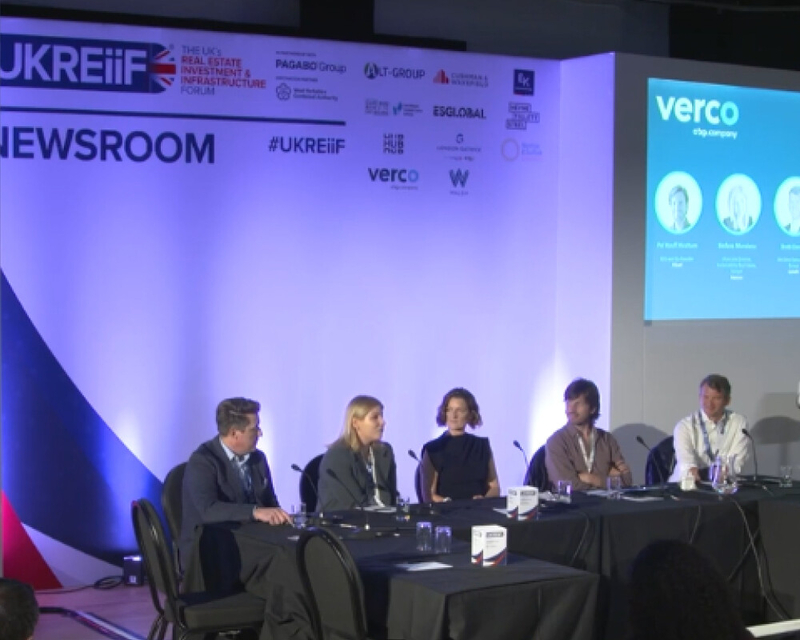Summary of the UKREiiF 2025 panel session hosted by BIP.Verco

BIP.Verco hosted a panel session at UKREiiF 2025 on how the real estate sector is using digital solutions to tackle the net zero challenge. BIP.Verco’s Tilly Shaw chaired the panel and was joined by a panel of experts from BIP, LaSalle, CQuel and Invesco. Their discussion is summarised below.
Accelerate your net zero delivery with digital and AI
The context
The real estate sector is used to having to look into the future, but many of us can admit that the future looks a bit alarming right now. There are oceans lapping at the edges of our major cities, huge tracts of land being rendered uninhabitable through drought and wildfires, and of course, there are some worrying seismic rumbles in the geopolitical landscape as well.
On top of this, we're looking at a new digital era. Artificial intelligence is increasingly going to be making decisions and acting on our behalf as we move into the next ten years. And that's going to change the way we live, work and interact. So as real estate professionals, we've got a bit of a challenge on our hands:
Firstly, we’ve got to bring the global real estate portfolio down to net zero in a safe and controlled way. Secondly, we must keep the occupants of those buildings safe from the ravages of extreme weather. And thirdly, we need to create future-proof spaces that are resilient and retain their value as the world continues to change.
Digital and AI can help us with this. A recent report suggested that global carbon emissions can be reduced by 4% by 2030 if we use AI and digital tools responsibly. It’s a toolkit we can’t afford to ignore. However, AI use does come at a cost. By 2030, it's estimated that half of all energy used in global data centers will be for AI processing. It comes at a huge water cost and a huge energy cost, and we have to balance that against the benefits it can offer us, which is what we’re going to do in this discussion.
The panelists and their experience

Brett Ormrod, Net Zero Carbon Lead, Europe, LaSalle
Brett is responsible for decarbonising LaSalle’s portfolios in Europe and helping their asset managers and fund managers set up and deliver their strategies. In the last three years, he helped run a large audit program that delivered over 225 audits across seven countries, using seven consultancies. This gave them a fantastic database to work with. The data highlighted what they needed to do at the asset level in terms of reducing energy and carbon, and what costs were associated with doing so. It’s a great example of how we can use technology and AI to make better decisions on how to measure costs and energy savings.

Pal Hauff Hvattum, CEO and Co-Founder, CQuel
Pal is the co-founder and CEO of CQuel, a London-based business operating all across continental Europe and the UK. CQuel was founded to address a challenge faced by many organisations: they have lots of net zero plans but move forward with few, if any. Decarbonisation projects take a lot of time and effort – either from internal resources or outsourced consultancies – so CQuel aims to use new technologies and AI (fueled by a network of almost 200 vetted suppliers) to take the pressure out of this step and help implement net zero plans, at scale, much more efficiently.

Stefana Moroianu, Associate Director, Sustainability Real Estate, Europe, Invesco Stefana works in the sustainability team of Invesco Real Estate in Europe. They manage a diverse portfolio of around 200 assets located all over the continent, so it's a particularly complex task for the sustainability team to set a strategy to deliver on a range of sustainability objectives on behalf of clients. One example, for strategies in scope, is to achieve net zero carbon by 2050, so over the last few years they have developed a decarbonisation program, ensuring each asset has a clear pathway to net zero. In Stefana’s opinion, the first step is optimisation, so she’s keen to talk about how digitalisation and AI can be used to support decarbonisation targets within strategies.

Matthew Penton, Director, Google Data & AI, BIP Group
Matt has worked in advanced analytics for over 25 years, viewing the evolution of AI first-hand. He’s worked on hundreds of projects involving digital transformation and data analytics. Currently, he focuses on Google-related insights and tools, helping customers to work out how much it costs to process their data, and using digital modelling to showcase how to optimise lighting, heating, electricity etc.
Case study – how is AI already helping with the net zero transition in real estate, and what are you hoping it will do in the future?
Brett:I'll start at the building level.
As Stefana mentioned, the easiest thing we can do is optimise existing systems within buildings, because there are far too many buildings that run inefficiently. We estimate (depending on building type, location and tenants) between 15% and 35% of savings can be made by simply making sure heating systems are not running against cooling systems, lights aren’t left on for longer than needed, and other easy fixes like that.
The next step, though, was to identify which of our assets had a Building Management System (BMS), and we approached a number of suppliers who could provide a kind of overlay on top of these systems. We deployed the first in 2023, on a multi-tenant, tiered, 300,000 square foot office building in London. The results were promising from the start. From the base year we were able to save 13% on electricity savings across the building and 7% on gas. That totaled around £70,000 to £75,000 of NOI increase that we could then reflect, which was a saving, a return on investment or a payback of just seven months. In the second year, the savings were much higher.
But I think what was most interesting for us was that the facilities management team, who you would expect to push back against the use of AI (this technology that can take on aspects of their job roles), really embraced the technology. Their time was freed up, allowing them to be proactive rather than simply reactive. They were managing about 6 or 7 complaints per day, and that was reduced to about 1 to 2 per day with the AI that was sitting on top.
Since, we’ve launched nine similar projects, training AI to model different heating and cooling modes to see how they would operate. I believe a lot of the technological solutions are already in place for us to get 80% of the way on our journey to decarbonisation, and now it's about people management. Most of my job involves bringing people together, facilities managers, asset managers and tenants. The reason why these projects take quite a while to implement is not because the software itself takes any significant amount of time, but rather that we have to make sure we have the right permission from a security and privacy perspective.
Pal: I agree with Brett on at least one thing: the technology is there, we just need to get it implemented faster so our plans can get off our desks and happen. AI and digital solutions can take those plans and break them down into actionable projects, enabling us to make decisions much faster. And while the AI takes care of that, we can focus our minds on challenges that still require the human brain.
There’s a concept called Amara's law, which basically says we always overestimate the immediate impact of a new technology and underestimate the long-term consequences. That's how our brains work. We think everything is going to change immediately because of AI. Yes, AI is going to change the way we do our jobs, but all that means is that we need to educate ourselves on how to use it most efficiently. Rather than panicking that it will take over everything, can we use it to streamline admin tasks like translating documents into the different languages and formats required by different stakeholders? Continuing to do things the way you did before will make you uncompetitive. The productivity gains over time from using the new technologies efficiently are just mind-blowing.
Matt: Yes, it's essential to make the most of the tools you invest in. It's no good having powerful tooling if everyone's using just 10% of it. Or if you’re not using it efficiently – for example, if you’re not sure of the right prompts, you have to have a whole conversation before you can get the answer you need. More requests, more processing power. In that case, could we have created a new problem? Or do we just need to be extra careful about creating specific parameters when we search? If you don't know what to do with the data, what comes up is absolutely useless, so the challenge now is learning to adapt to the AI models we use day to day.
Stefana: I would say, within real estate and real estate investment, we're still very, very old fashioned. We still use a lot of Excel and manually input a lot of data. So, before we even get to what we can do with the data, we have to make sure that our data is reliable. My wishful thinking for AI would be to find solutions that automate data collection. Really practical solutions for getting real estate and ESG data right before going into further analysis.
Brett: I completely agree. It's about getting the data right, but it's also about reporting. Our team spends a disproportionate amount of time – expensive time – setting up reports for clients. I'd love for AI to automate all that process and send it out in a format that doesn't take up 60% of the team's time. We really need to spend a lot more time on doing things as opposed to reporting on things.
Key takeaways
- Large language models (LLMs) are reducing friction within the CRE sector, by speeding up highly bureaucratic tasks such as due-diligence checks or leasing arrangements. Over time, this can be expected to lead to a more liquid market with reduced transactional risk.
- Real estate as a sector has an incredibly complex web of stakeholders. Even when these stakeholders agree that a climate transition is essential, they each have their own documentation, processes and financial tests. LLMs can drive multi-stakeholder engagement by translating data from one format to another, or by analysing large quantities of information.
- While we cannot afford to ignore the powerful contribution digital and AI will make in addressing the climate emergency, there is a need to carefully manage the selection, testing and rollout of tools within live business environments. These are energy-and water-hungry technologies and there are still huge ethical concerns about bias, privacy and intellectual property to be navigated.